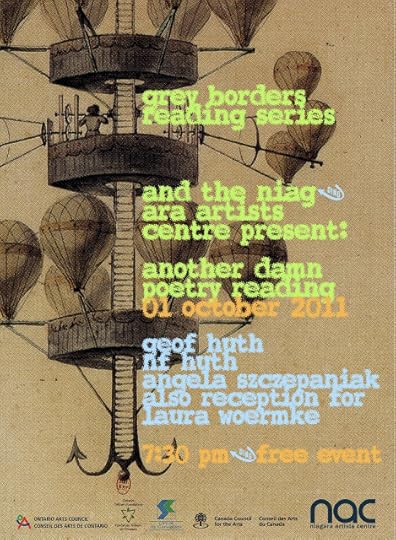Geof Huth's Blog, page 22
October 27, 2011
Between an Eyesle and Not Being Found
[image error]
Geof Huth, "an eyesle" (27 October 2011)
I've been in meetings, a big quarterly meeting broken into parts, for the last couple of days, so I have spent some time scribbling little inky fidgetglyphs onto sheets of paper. I think as I write. I listen. I stop and speak. I have plenty to say. But the fact of a flat table before me, along with pads of paper and a pen or two, leads me create these little objects of textual contemplation.
Recently, though, I have been photographing them through a little app on my phone, and this app modifies the glyphs, makes them into something else: photographs, sure; digital objects, sure, to a digital archivist (and who among us isn't one these days?); but also something else: simply, a changed poem. The process of copying these poems changes them.
So these become not the handwritten relics they originally were; they become instead a digital poem with a digital life and a form and aura altogether different. The digital capture of these small writings was nothing more than a way to represent the originals, but it has become a way to extend them visual: to heighten their extant features, or to dull them, to make them hazy, or to edit them.
So now the mouth speaking out of the bottom corner of one of these poems and more only a voice. Nothing more than a silent sound reverberating through space.
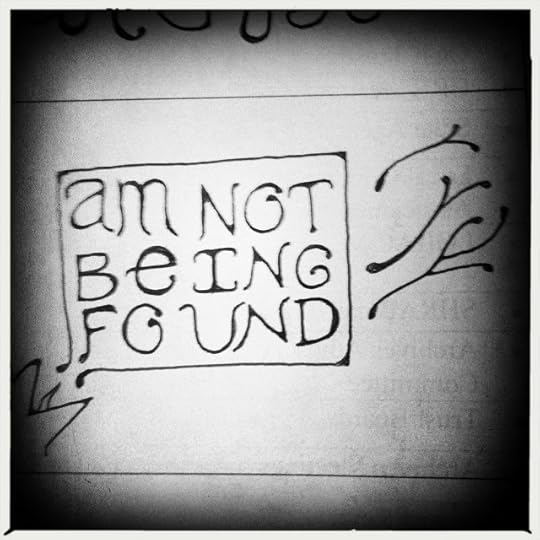 Geof Huth, "am NoT / BeING / FOUND" (26 October 2011)
Geof Huth, "am NoT / BeING / FOUND" (26 October 2011)
ecr. l'inf.
I've been in meetings, a big quarterly meeting broken into parts, for the last couple of days, so I have spent some time scribbling little inky fidgetglyphs onto sheets of paper. I think as I write. I listen. I stop and speak. I have plenty to say. But the fact of a flat table before me, along with pads of paper and a pen or two, leads me create these little objects of textual contemplation.
Recently, though, I have been photographing them through a little app on my phone, and this app modifies the glyphs, makes them into something else: photographs, sure; digital objects, sure, to a digital archivist (and who among us isn't one these days?); but also something else: simply, a changed poem. The process of copying these poems changes them.
So these become not the handwritten relics they originally were; they become instead a digital poem with a digital life and a form and aura altogether different. The digital capture of these small writings was nothing more than a way to represent the originals, but it has become a way to extend them visual: to heighten their extant features, or to dull them, to make them hazy, or to edit them.
So now the mouth speaking out of the bottom corner of one of these poems and more only a voice. Nothing more than a silent sound reverberating through space.
 Geof Huth, "am NoT / BeING / FOUND" (26 October 2011)
Geof Huth, "am NoT / BeING / FOUND" (26 October 2011)
ecr. l'inf.
Published on October 27, 2011 20:53
October 25, 2011
L'arc c'est toi
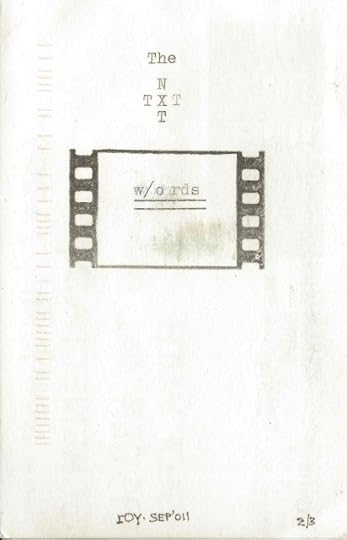 Roy Arenella, "The NXT/TXT" (September 2011)
Roy Arenella, "The NXT/TXT" (September 2011)I am rarely a mailartist anymore. I stopped on my birthday, when I stopped sending a poem out each day for an entire year. I've made only one set of postcards I've sent out to folks this year. I am slowing down, becoming winter, a slow cold. I cannot create as I used to. I am given over to slowness.
But some people still send me pieces in the mail, things to think about, to be thought of. I think of them. One of these senders of mail, though slow now himself (at least in my direction), is Roy Arenella. His cards are visual poems, but on his own terms. He follows no fashion for he fashions things anew.
Working with small pieces, things like the letters of words and the simplest of images, Roy creates a set of punning, a quiet humor, something to keep us thinking. He thinks quietly out into blossom.
So the title of his card to me last month was "The NXT/TXT," where the e's are easily left out, and the x becomes a still point of spinless spinning where two words are held together. He introduces to us the idea that there will be a text that replaces text.
And this text appears within a frame of film, and the text is an image, and the image is the frame itself and the word "w/ords," the idea of images becoming text, even when those images are merely text.
Because text is visual language, a future idea, but from the past.
We used to call it retrofuturistic.
It all circles back to itself.
ecr. l'inf.
Published on October 25, 2011 19:32
October 24, 2011
L'art c'est moi
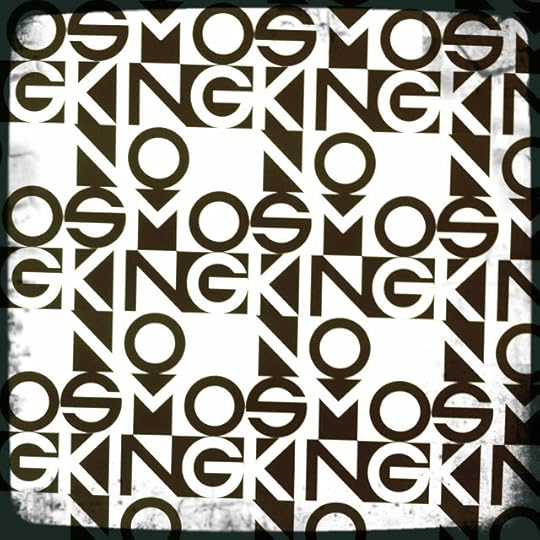 George Brecht, "No Smoking"We are overwhelmed or taken over by the image of the artist. That is what stands between us and the art.
George Brecht, "No Smoking"We are overwhelmed or taken over by the image of the artist. That is what stands between us and the art.Yesterday, I found myself, almost totally unexpectedly, at the Museum of Modern Art (MoMA) with the French-Canadian poet Steve Giasson (whom I was trying to meet), the English poet Phil Davenport (whom I had no idea was in New York City). I drove from Bethlehem, Pennsylvania, to New York City to meet up with Steve and his fiancé Martin, both of whom I'd met at the Text Festival in Manchester, England, earlier this year.
Once at MoMA, I knew what show I wanted to see, and it was the show Steve and Phil wanted to see as well. It was the reason they were there. We are made from the same substance and are draw to the same things, drawn out of ourselves, and drawn onto the page.
Yet we were entirely different. I come a background that is, to some degree, curatorial, so I keep my distance from the pieces on display, though I tend to get very close to them. Phil, however, managed to make the guards nervous twice while he was engaging with the pieces, and once I had no idea what their issue was.
When I'm at an exhibit, my intensity of focus wipes much thinking from my brain. I don't talk much, I peer, I perceive, I exist, but this intensity isn't slowness. I move through space. I review a wall of works in a glance and find something that requires my attention. I read a label. I eat a word. I eat an image. I follow a line and watch everything on it move past me like a filmstrip. When I interact with the works, as I did yesterday in that sparsely attended exhibition, I sing quietly and might record it as I do. I am of the works before me, made out of them. I am paint and ink and paper and canvas and metal melted than rusted into place.
Phil and Steve were talkers. Their peering made mine look like glancing. They moved through the rooms with a deliberate slowness, a ravenous attention. And works would stop them in place for minutes and cause them to have thoughts and to talk animatedly to each other about the works. They were not hoarding sustenance for the winter; they were sowing a field and growing a crop.
What were two separate activities for me were a melded whole for them. It was a beautiful thing,
[image error] Martin Vinette and Steve Giasson beside an Exhibit of Fluxus Musical Instruments, MoMA (23 October 2011)
and outside the realm of my desire to emulate. If they were raptors soaring high over a field and surveying everything as a piece made of pieces (they were constructors of wholes, of intentions), I was a field mouse moving quickly, pausing at a smell or sound, raising my nose slightly, perceiving, moving on, and given over to the beauty of the little pieces before me, pieces I could not tell were a field.
In one of the rooms, Phil stopped to discuss one of the thoughts he had, and it was how ironic the exhibition was, because most of these Fluxus pieces were meant to be manipulated, to be interacted with physically. (It was a thought I had encountered, particularly when watching the pieces filled with drawers or the Tactile Box, into which a percipient was to slip a hand to feel, but not see or even smell, the art—but it was also a thought I let float away, unready to entertain considerations of the scenes flashing by before me.)
When Phil made his point, I agreed, but only before disagreeing, noting that a display, for design's sake, of spoons (each meant to be used, to be interacted with) might not elicit this thought from Phil, but that that would be just as ironic. The maker had intended the spoon to be used, but curatorial practice made the use of the spoon verboten. Phil did not agree with me, pointing out again the intent of the artist.
And that is when I saw it: We imagine the intent of an artist to be special, to be (actually) more intentional than the intent of a craftsperson or a designer or a dabbler. We allow the artist to be the device through which we see the art, and thus we are always a step away from the art, trying to crane our heads around that person so that we can see the thing itself.
But maybe there isn't the thing itself.
After Fluxus, after standing by a staircase and front of a huge wall of George Brecht's "No Smoking" for minutes talking (though I took more pictures and said fewer words), we broke into two, some of us going to the de Koonig show on the sixth floor.
Now, de Koonig is no favorite painter of mine (that is Paul Klee), but I can appreciate his talent and the way it wrenched himself from physical place to visual space, even as his interest in breasts continued unabated.
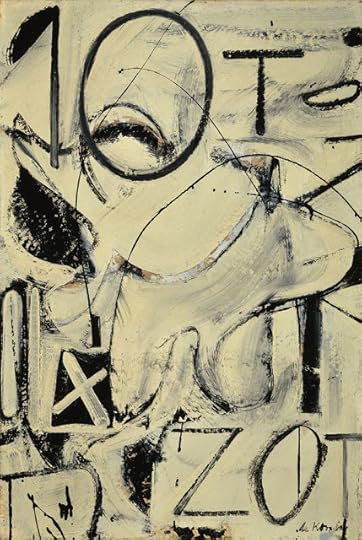 Willem de Koonig, "Zurich" (1947)
Willem de Koonig, "Zurich" (1947)Although this retrospective showed that de Koonig was hugely talented even as a twelve-year-old, and even though this exhibition was filled with huge and colorful paintings, the first paint I saw and loved was a small one called "Zurich." The title seemed strange, given that the meaningless but polysemous word "ZOT" filled the bottom right hand corner of the canvas. Essentially a bitonal piece, it captured my imagination by being a visual poem, by being about the painterly presentation of word and letter. From a distance, I pointed out the painting to Steve and Martin, noting that it was a visual poem.
But what bothered me about the painting, what bothered me about the exhibition as a whole, was something small, something most people didn't really pay attention to: it was "de Koonig." I don't mean the painter per se, but certainly him, too; I mean his name, which was painted on every canvas, thus disrupting the tableau, which in this case was of word and letter and color.
This signature because to bother my old concretist tendencies. The mid-century concrete poets generally produced works of such rectilinear precision that adding a signature, a clearly foreign beast, would destroy the structure of the poem. So they generally removed themselves from the scene, leaving only the scene itself.
It has been what I have aspired to.
At some point, a crowd of us was huddled in a circle, and Steve and I were talking about our work. Steve is a massive and splendid appropriator, pulling together words (generally in English, though his tendency in speech is francophone) from different sources to create conceptual pieces. Martin explained all the arts Steve had moved through to become, eventually, a poet, and Steve explained how, even in poetry, he had moved from lyric poetry into his hardcore (my term) stance.
I noted that I've never given up on any mode of expression, that I continue to write lyric poems, emotional poems, narrative poems, along with much else. Steve said he enjoyed my sound poems, having sat just behind me in Manchester when, while standing in a cone of spotlight, I'd sung a strong good sound poem into the enveloping darkness of the theater. And he said that he saw my work as radical, not traditional.
I noted that my work was various, and then I made another connection: that my tendency now is performative, that I am trying to create an art that disappears into the ether, even as I try to catch it, to hold it in place, with recordings. Martin and he were surprised that my poemsong was extemporaneous; they, as many others have, assumed I was singing a piece I had memorized.
But I am not made of memory, only memories.
After walking into another room of paintings, I ran across another painting of de Koonig's of a visual poetic nature, and it was entitled "Zot." I found it interesting that de Koonig had created (I almost wrote "had written") two paintings two years apart both with the word "ZOT" painted into a lower corner. I wondered if he had done so intentionally, for the paintings are quite similar, or if his own tendencies just pushed him in the same direction once again.
[image error] Willem de Koonig, "Zot" (1949)
And I wondered if de Koonig, even as he wrenched his style from place to place, could ever escape himself. I wondered if he worried about being between his art and his audience. I wondered if he always saw himself when he saw one of his paintings.
During our earlier discussion of artistic intention, I noted that bpNichol had once produced a small leaflet poem that was intended to be burned. To make the poem, to complete it, the reader had to set it afire and watch it blacken and burn. In this way the poem would be made into itself. Yet, I noted, not everyone burned the poem, because we are all a part of the irony. We are all liars when it comes to intent, and we all want two things at once.
So the readers want to save the bpNichol object, to objectify it. So the Fluxists sold their works. So the curators preserved these works by making sure they were not used as intended. So the audience paid an admission to see some pieces meant as throaways. So the humorous and arch Fluxists became seen as serious and separate from themselves. So it took decades for de Koonig to depart from representation. So the visual poet sees visual poems where others see paintings.
So what I imagine the artist should be is the art itself. So I assume the only way to destroy the artist so that the art can be seen is to make the artist the art itself. So I dance and sing and write a poem, and yet I am so separable from the dance, the song, the poem.
So even the words that come out of my body, from the deep source of themselves, are not me at all. So maybe I am not either.
So, so.
After a brief stop at a coffee shop, where the crowd of us ate and talked about everything, and only about poetry, at the place where Phil had his first egg cream (which is nothing like what it sounds it will be), where we spoke in languages about language, at the coffee shop that closed before dinner so we closed it down, we stood outside talking in the growing cold before walking a short way together and then parting.
A bit more than an hour later, I was driving north out of the city. After stopping for the night, I stayed up until 2:45 doing something for my son Tim (something that, ironically, he ended up not needing me to do). The room I slept in was cold, and my thin frame shivered during the night, so I slept fitfully and for only three and one quarter hours. Yet I went to work today, and even worked an extra long day, writing many pages of text as I moved through time. Yet I came home and ate and wrote, after so many days of silence, this huge essay about my yesterday thoughts, those few I've held onto.
Because I am an artist, so I am always getting in the way of my art.
If I've made any sense here it is an accident of nature, something that happens only because I've done so much writing in my life that it is a form of breathing. As I try to turn into my art itself, I push myself, ever so much forcefully, in front of my art.
So no-one can see it.
ecr. l'inf.
Published on October 24, 2011 18:51
October 12, 2011
Object Poems (Opening, Exhibition, Performance)
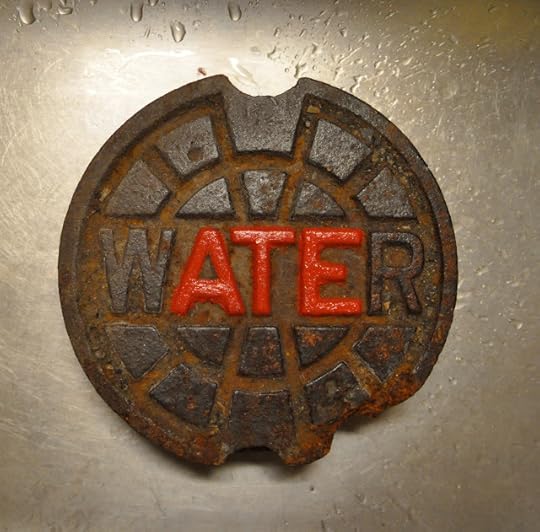 Geof Huth, "ATE," An Object Poem in Development (11 October 2011)Because I don't know how to stay in one place, I'm flying to Portland, Oregon, on November 4th, so I can be at the opening of an exhibition of object poems that will include some of mine. On the 5th, I'll be part of a poetry reading, though I always call these performances, since I read some, but not all, of the poems I perform. It will be good to be back in Oregon, the birthplace of my great-grandmother, one of them, born in the Willamette Valley, one of the two places where good pinot noir grapes can be grown.
Geof Huth, "ATE," An Object Poem in Development (11 October 2011)Because I don't know how to stay in one place, I'm flying to Portland, Oregon, on November 4th, so I can be at the opening of an exhibition of object poems that will include some of mine. On the 5th, I'll be part of a poetry reading, though I always call these performances, since I read some, but not all, of the poems I perform. It will be good to be back in Oregon, the birthplace of my great-grandmother, one of them, born in the Willamette Valley, one of the two places where good pinot noir grapes can be grown.Here are the real details. Oh, and the poem above isn't finished. It won't be in the show. I'm glad I didn't have to ship such a heavy item across the country.
Object PoemsNovember 4 - 26, 2011
23 Sandy Gallery
623 NE 23rd Avenue
Portland, Oregon
23sandy.com
Opening Reception: Friday, Nov. 4, 5:00-8:00 pm
Reading/Performance: Saturday, Nov. 5, 4:00 pm
Object Poems brings together striking and varied works
by more than thirty contemporary artist-poets and poet-artists:
poems in three dimensions
found poems
sculptural and utilitarian poems
conceptual poems
poems that depart in myriad ways from the familiar form of the printed page.
Participating Artists: Drew Kunz Alison Knowles Joseph Keppler Nico Vassilakis Harriet Bart
Michael Basinski Bill Berkson Jen Bervin Kristin Prevallet Clemente Padin
James Yeary Alec Finlay Steve McCaffery Eric Magrane Jim Clinefelter
Norma Cole J. A. Lee Leo & Anna Daedalus Marilyn R. Rosenberg Geof Huth
Mary Ann Hayden Alan Halsey Buzz Spector Kyle Schlesinger Kaia Sand
Curtis Steiner Mark Owens David Abel Andrew Topel K. S. Ernst
ecr. l'inf.
Published on October 12, 2011 20:27
October 6, 2011
Where the Sky is Big Enough for Clouds
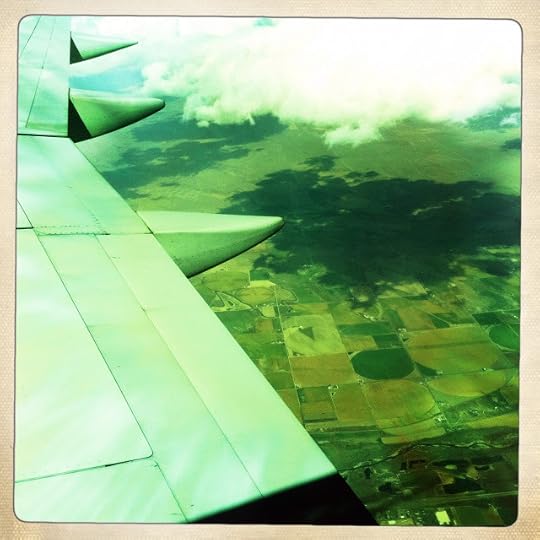 View from the Plane Descending to Denver (6 October 2011)
View from the Plane Descending to Denver (6 October 2011)
SpringHill Suites, Room 109, Cheyenne, Wyoming
I am in Wyoming for two nights. The purpose of this trip is archival, but poetry follows me everywhere. I read Martin Glaz Serup's new book <i>The Field</i> on the first plane flight of the day, and it inspired a few short poems by me. Soon, I'll write a few words about that, but not tonight. I'm giving an all-day workshop tomorrow, and I'll need a little sleep, maybe a lot.
The last leg of my journey to Cheyenne was by car from Denver. It's not a long drive, under two hours, but the wind was blowing hard, and dust was in the air. The young man at the rental car place called it a dirty wind and suggested we sit inside the car to talk.
Last time I drove up I-25 was in 1997. My family and I were taking one of our cross-country trips, and we were driving north looking for a place to stay. We wanted to stay in Cheyenne, but when we looked for a hotel there, we learned that there was a rodeo going on. (Over time, we learned that if a big rodeo was going on in the West, then we'd have to drive about 100 miles from the center of it to find a hotel room.)
So we kept driving, but we were low on gas, and there were not many places to stop. We were driving on empty, something that doesn't really bother me, though Nancy doesn't enjoy that kind of excitement the way I do. Finally, we made it to Chugwater and got off the Interstate. We found gas, and were fine, and all of this happened with minutes to spare before the station was set to close for the night.
We still needed a place to spend the night, so we drove north to Wheatland, stopped at the hotel there and got a room. Before we left the front desk, another family entered looking for a room and were told that there were no more rooms. We had the last available room in Wheatland, which was only 70 miles from Cheyenne.
The hotel was fine, with a fine little restaurant right next to it. The next morning, we met an older couple from Bear Mountain, in New York's Catskills, not to far from Albany, and they were driving across the country too. It was good to think of people carrying out such strange dreams so much later in life, it was good to have found gas and a room for the night, it was good to think ourselves fortunate, for at least one day.
And this has nothing to do with poetry (though something about the subtlety and somberness of the Wyoming landscape does remind me of Martin's book of poems).
Some days, the past just comes back to you quickly. Like the 75 mph speed limit here, with me doing 80 most of the way. Like the wind blowing sideways and dirty against my little hybrid vehicle. Like the sight of tumbleweed again.
Tumbleweed rolling across the highway. Tumbleweed being shattered by the cars that hit it. Tumbleweed shattering into smaller tumbleweeds that kept rolling. Tumbleweeds as this fractal plants, the internal structure of which could never be destroyed. Or forgotten.
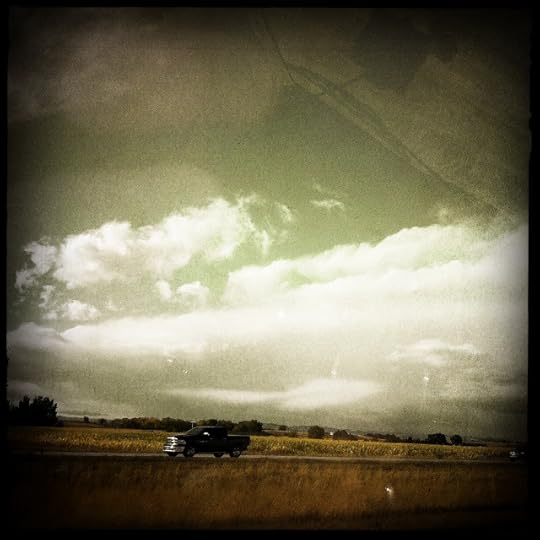 Clouds from I-25 in Colorado while Driving North to Cheyenne, Wyoming (6 October 2011)
Clouds from I-25 in Colorado while Driving North to Cheyenne, Wyoming (6 October 2011)
ecr. l'inf.
Published on October 06, 2011 20:47
October 5, 2011
Travelling (Back and Forth)
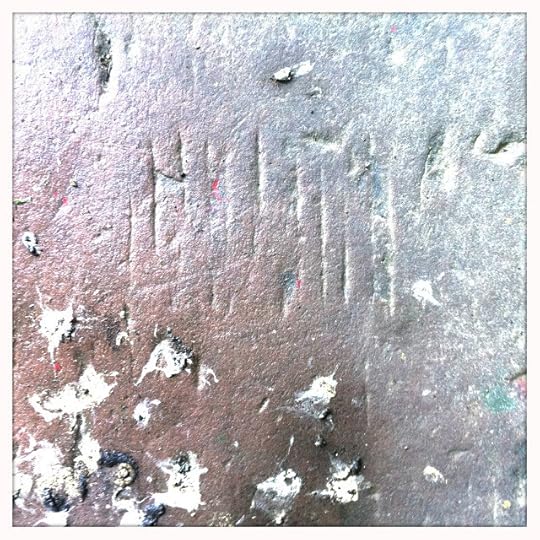 Geof Huth, "Doorstep: A Sense of Myself" (2 October 2011)
Geof Huth, "Doorstep: A Sense of Myself" (2 October 2011)On Saturday, I drove to St Catharines, Ontario, to perform, and I did.
On Sunday, I drove back home, stopping at Genesee Country Village and Museum (a collection of old buildings of many kinds, though primarily houses), and I found a doorstep there that reminded me of myself.
On Monday, I drove to Buffalo, a little shy of St Catharines.
Yesterday, I was in Buffalo for an all-day symposium on electronic records.
Today, I drove back home from Buffalo and went to the annual Capital District Archives Dinner, which is always early in October, which is the month we call Archives Month in this country, and the dinner went late.
Tomorrow, I will forgo another drive across the state. Instead, I'll fly to Cleveland, then to Denver, and from Denver I'll drive to Cheyenne, Wyoming. It's only a two-hour drive, so less than I'm used to.
I am lucky it is impossible for poets to become tired.
<i>ecr. l'inf.</i>
Published on October 05, 2011 20:43
October 4, 2011
What Yesterday Teaches Me about the Day after Tomorrow
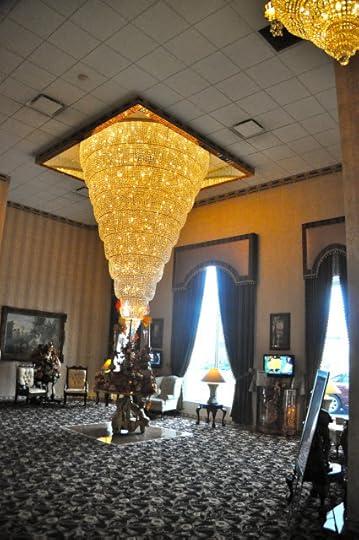 Geof Huth, "Unassuming Chandelier in the Lobby of the Garden Place Hotel, Williamsville, New York" (3 October 2011)
Geof Huth, "Unassuming Chandelier in the Lobby of the Garden Place Hotel, Williamsville, New York" (3 October 2011)Garden Place Hotel, Room 159, Williamsville, New York
I am spending a second night in a strange place, a hotel in the Town of Amherst that is gaudy to the extreme ("so over-the-top that it can't see the top anymore," as I said to Jim and Patti Tammaro yesterday) but which is also quite pleasant hotel to spend a couple of nights.
I am in the middle of traveling for eight or nine days straight (depending on how I count days), returning home tomorrow for a moment before flying to Denver and then driving to Cheyenne. The world is a big place, and there are surprises within it.
Yesterday, I took my rental car through a tollbooth without the transponder I needed to pay for tolls. I did this even after reminding myself not to forget the E-ZPass tag. (I never listen.) I turned around to retrieve it.
And that error, that act of return, allowed me the chance to experience another strange event yesterday, a sequence of events that only I, of everyone in the world, could experience without being a part of it.
First, though, I have to note that the other problem with my rented SUV was that the low-fuel light came on almost as soon as I hit the New York State Thruway, with about twenty miles to drive before the appearance of a gas station. Even though I had thought that the manager of the rental car branch was telling me there was a quarter of a tank of gas in the car, she was actually telling me to bring it back with a quarter of a tank in it. (I never listen.) After I parked the car, I noted that my rental car statement showed the level of gas as "NO GAS," which is low indeed.
Stopping at the first possible rest area so that I could fill the vehicle with gasoline, I decided to buy myself a frozen coffee drink first. Yesterday was a warm day, and I am often warm when it is not warm. But I had to remind myself over and over to remember to fill the car with gas after buying my drink.
And I may have forgotten to buy the gas, given what happened at the coffee shop at the rest area. As I walked up to the store's counter, the man in line ahead of me was calling the young woman (petite and attractive), Stephanie and asking her if he knew how he knew her name. "I'm wearing a nametag," she answered, "I have a brain, you know."
I had seen this same woman on Saturday, as Nancy and I drove across the state on our way to give a reading in St Catharine's, Ontario. Nancy never saw the woman because she stayed in the car, having slipped on the wet back deck of the house the morning before hitting her back severely and putting her in great pain. (The multitudinous X-rays she was given showed she had no fractured vertebrae, except for the old fracture. Thing is she had no idea she had fractured her T1 vertebra sometime in the distant past. Surprises lurk everywhere. It might be their lurking that makes them so surprising.)
After annoying Stephanie with the question about her name, the man asked her what she thought of the yogurt the shop had for sale. She said she liked it, so he carefully, after studious consideration, chose one of the nearly identical yogurts. The transparent container held yogurt in its bottom two thirds and a plastic basket of granola held in place in the top third. The man asked what he was supposed to do with the granola. Stephanie explained that he was supposed to mix it into the yogurt.
Once he left, I ordered my drink: "A venti mocha frappucino," I said, and I agreed to accept the whipped cream as well, calm in my knowledge that such a substance is not good for a person with my genetic proclivities. Given how efficient I was with my ordering and paying (by card that merely needs to be swiped), I found myself in line behind the same awkward man once again.
He had already begun to work his flirtatious magic with the woman preparing his drink (some complicated coffee drink with substitutions from the norm, including the request that it be nonfat). He asked the woman how to mix the granola into the yogurt, but he figured it out himself. He asked her why the granola was kept separate, but then realized the answer and explained it was so the granola would not become soggy. He asked if the police could arrest him for driving while eating yogurt.
This woman was taller and less attractive than the other, but she was just as annoyed by his attention. After he walked away, the women first made sure that he had made it out of the building and then they started chattering about how annoying he was. This was the most animated they were. It was complaining about others that brought them to life.
I watched this entire act with a bemused smile on my face. All three of them entertained me, and I was happy to watch them, and happier not to be part of their comedic drama. I did not say a word to the woman or the man. Instead, I left the building, filled the car with gasoline ($67.69, I believe), and headed back onto the Thruway heading west at a nearly constant 75 miles per hour.
I stopped at the next rest area so I could use the restroom. After parking the car, I pulled out my phone to check for email and I looked out of the SUV in time to see the same man walking from the gas station with a container of gasoline. He was walking eastward, toward his car, which had, apparently, run out of gas. I've no idea how far back he was, but it could not have been too far. I didn't see his car on the side of the road, maybe because a tractor-trailer had cut me off suddenly within the last mile of the drive to that rest area.
As I saw that sad human walk eastward with his handful of gasoline, I felt sorry for him. He's a person who doesn't fit in this world. Not that any of us do. He's someone doomed to be trapped by his own personality, by his own self. Not that we all are not.
These fleeting compassionate thoughts of mine reminded me of living in the dormitory of the American School of Tangier. I was always given the roommates that no-one else wanted, like the high school boy who was still wetting his bed, and I was given them because I would be patient with them. I was the oldest of six children. As a matter of fact, though I almost never see any of my siblings, I am still the oldest of six.
I couldn't watch the man's entire trek, but I realized that he had suffered a fate I had escaped myself only because I had managed to remember something. (I never remember.) Otherwise, I'd be the man walking along the Thruway with cars driving by me fast enough that their speed could suck me into traffic.
But it didn't happen.
As humans, we enjoy narratives, especially narratives of unexpected coincidences. How, for instance, I became the only person to see this poor man's two unfortunate situations of the day: his interaction with two women and his running out of gas. How his story intersected with mine in ways that did not connect directly to the story at all. How we put things in context in order to understand them, even if the context that makes understanding possible is different for each of us.
This is a poem. This is a poem about my life as a human, as a poet, so it is a lyric poem. This is a poem about all of us.
As if any of us deserves a poem.
Tomorrow, I drive across almost the entire broad state of New York for the fourth time in five days, and for the sixth time in less than a month. Everything repeats, and that's how we remember everything, that's how it all seems meaningful.
The day after tomorrow, I fly to Cleveland, and then I fly to Denver. From Denver, I will drive to Cheyenne, Wyoming. I drove that way with Nancy, Erin, and Tim, once. I think it was in 1997. I drove from Denver past Cheyenne, where some rodeo was taking place, so I kept driving, I kept driving us north, past Chugwater and to Wheatland.
I think on Thursday, I'll be thinking of Chugwater again, because our car was low on gas, and we couldn't find a gas station in Chugwater so we continued north, not sure if we would run out of gas and be stuck on the east side of the road looking south for assistance.
ecr. l'inf.
Published on October 04, 2011 20:59
October 3, 2011
Against///Impression
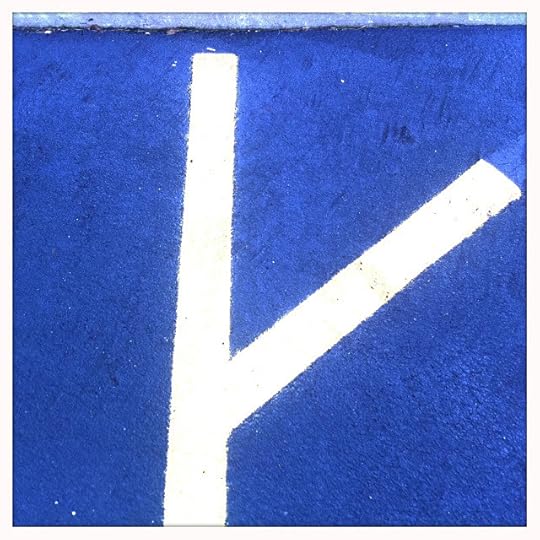 Geof Huth, "Almost y" (Williamsville, New York, 3 October 2011)
Geof Huth, "Almost y" (Williamsville, New York, 3 October 2011)Garden Place Hotel, Room 159, Williamsville, New York
For the second night in a row, I'm writing a blog entry based on a note to Gary Barwin. Part of the reason for this, I assume, is that Gary interviewed me on Saturday for Jacket2, and his questions (which showed an interest and understanding of what I'm trying to do as a poet) have made me continue to this about my ideas about poetry and the project I envision for myself within the realm of poetry.
I think my involvement in poetry is wide in scope and actually radical in a few ways off-putting to many. (I base this latter point on evidence from poets themselves.) I find this apparent radicalism interesting because the new conceptualists' conceptual work overlaps mine only marginally, but they see themselves as the true avant-garde. I just don't even believe in the avant-garde myself. My concerns are too broad in scope to allow the concept of the avant-garde to serve as an external limitation to my work.
This year at the Text Festival, my friend Christian Bök gave my friend derek beaulieu some of his own time in the evening performance so that derek could read a conceptualist manifesto. It could have been called "Against Emotion" (in place of "Expression"), because he argued against the millennia-old lyric on the basis of the sheer accumulated mass of such poems (which is too simple an argument for me: audience interest may flag with extreme volume, but quality still must be assessed individually [and I say this heavily aware of how weak the lyric impulse in poetry has become as an engine for creating good poetry]) and because the poet's own emotional concerns are of no real concern to readers (but, to the same degree, so are the poets' intellectual and conceptual concerns, and personal concerns can, of course, become generalizable—also, I think the pure lyric is perceived where it does not, in fact, exist: some speakers in poems are simply not the poet, being merely esthetic and rhetorical creations, even if they serve as the mouthpieces and touchstones of the poet).
So why all these words? Because derek was truly angry in his denunciation of the lyric and its emotionalism. Because it was emotion that drove his intellectual concerns. Because emotion in humans derives from the intellect. And because I, who often write ostensibly cold and intellectualized poems, see emotion as another effect of language, along with its sonic and visual characteristics, emotion being part of the raft of rhetorical features of language. And I don't want to give away the tool.
The last poem I performed in St Catharine's the other night was a longform spoken sound poem, a dramatic piece spoken in Unglish (my current name for the glossolalia I use in my otherwise wordless sound poems). In this last piece, the message (assuming a work of art can be reduced to such a categorical nicety) was that language is bigger than we like to admit and that poetry can (and even maybe should) incorporate these possibilities into its toolkit. These include gestures, facial expressions, even gross (as opposed to fine) movements of the body, and these are often markers of emotion as well. People could understand most of what I was saying even though I was speaking gibberish, and that gibberish was essential to the meaning of the poem. Also, the expression of emotion and the creation of the same in the audience were essential to the success of this performance poem—the audience had to become part of the poem, performers in the poem (by repeating sounds I told them to repeat, by reacting emotionally to the performance).
Again, why am I going on so long about this while I'm tired and typing with one finger into my iPhone? Because I don't want to be limited by the restrictions of my own vision. Because my project is always to be bigger, not smaller, and not ever to believe that there is one true way.
I am not religious, and I will not make poetry my religion, even if it is my life.
ecr. l'inf.
Published on October 03, 2011 20:59
October 2, 2011
A Night We Will Remember
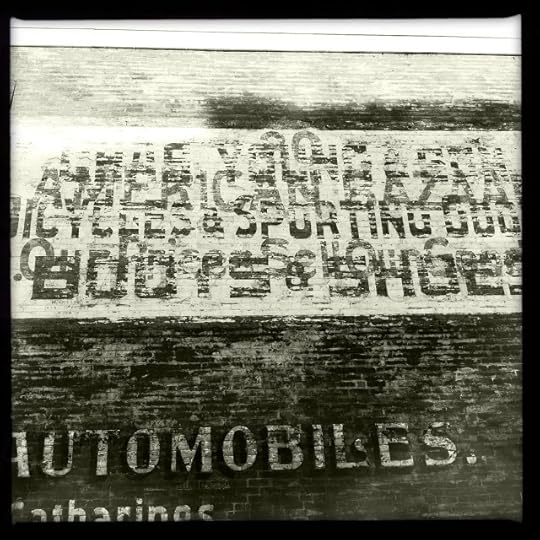 Geof Huth, "Urban Palimpsest" (2 October 2011)
Geof Huth, "Urban Palimpsest" (2 October 2011)Yesternight's poetry performance was one of my favorite ever. The space was beautiful (and filled with the haunting and beautiful paintings of Laura Woermke's Sick Secrets [the secret is her focus on mouths, which is so appropriate for a poetry reading), Angela Szczepaniak's poems were funny and endearing and designed to push us into thinking, Nancy presented her quiet yet vibrating poems in her calm and statuesque manner), and I had more fun with the space than I almost ever have, ending with a strange spoken and acted sound poem (all in Nonglish, my native tongue), a new attempt for me, and one that proved to me (only more what an actor I am).
So many thanks for this night, last night. To Gary Barwin for finding this venue for Nancy and me, to Eric Schmaltz for being a great emcee and organizer (I loved his voice during it all, and I apologize to him for going over in time, even though I'd carefully timed out the show ahead of time [okay, I went only one minute over]), to Ryan Rivando for helping me with the technology so that my visual poems could project on the screen and so that one of my poemsongs could play around us while I read a poetic essay/review through it, to Gregory Betts for coming out and going out with us afterwards for drinks (though I'm going to make a rule soon that poets can talk about Christian Bök, whom we all love, anymore when we go out together), and to Laura Woermke for her paintings--their colors made me want to lick them.
Just now, I sent this short thank-you out to Gary Barwin, which I present here as additional public thanks to him:
Thanks for everything: setting up this reading for us, choosing a series well, spending time with us, setting up the interview, asking questions that showed that you'd thought about my work (as I'd thought no-one'd ever done), choosing that restaurant for us, making Nancy's beautiful chapbook beautiful, supporting us at the performance, drinking with us afterwards, putting up with whatever craziness of mine I pushed on you (I'm best in small doses!), being there, being the kind of person more of us have to be. It was a great day, a whirlwind, and great great fun. I live through the wretchedness of life for days like yesterday, and there are not enough yesterdays to fill up even all the future I have. I was so happy to be home in Canada again.
One thing I forgot to say in my interview, but which I repeat all the time (if quoting oneself isn't megalomania, what is): I sing because I can't sing, I draw because I can't draw, I write because I can't try.
But, boy, do I try, and yesterday was an inspiration for me, a chance to be what I am. Too bad I went way over time!
ecr. l'inf.
Published on October 02, 2011 20:57
September 27, 2011
The Poetry Reading Cometh (to St Catharine's, Ontario)
Published on September 27, 2011 17:47

